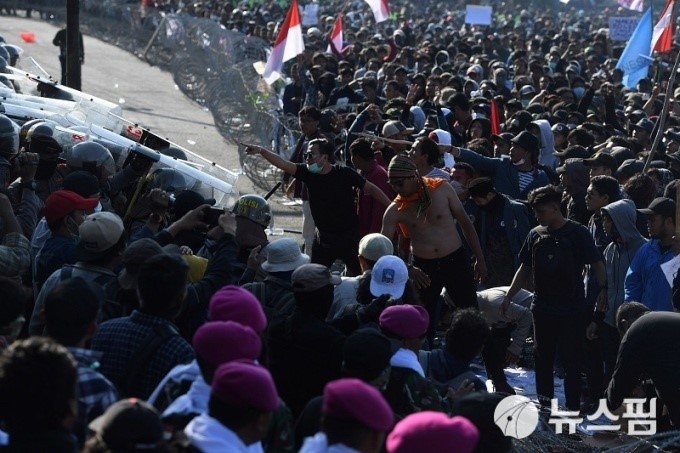Massive protests against proposed revisions to Indonesia’s Corruption and Criminal laws have been held in major cities such as the capital Jakarta and Makassar for three days. The council of Indonesia has been trying to amend the criminal law, which was borrowed from the Dutch colonial era, to be more in line with Islamic Common Law. Changes to the criminal law would make premarital sex, cohabitation and abortion illegal and thus punishable by law. In addition, proposed changes to the anti-corruption law are said to severely handicap the operation of the anti-corruption council, a body that citizens call crucial in a state where fraud is commonplace.
Opponents are calling the changes to the criminal law an invasion of privacy and the regression of democracy. According to the revised bill, premarital sex would become a criminal offense and anyone cause in violation can be sentenced up to one year in prison. Living together out of wedlock can earn a guilty party 6 months in prison. Under the current law, only men and women with spouses can be punished for adultery. If the revised bill is passed, premarital sex and premarital cohabitation as well as homosexuality will be punishable by law. It will also become illegal to insult the president, vice president, religion, and any national symbol.
 |
| ▲ Massive protests against the revision of criminal law and anti-corruption laws are underway in Indonesia's Surabaya region on Wednesday. (Photo from Newspim) |
The bill was originally scheduled to be put to a vote on 24th September, but the Indonesian President Joko Widodo delayed the vote until the 27th, stating that it required more review. But Indonesian citizens are concerned that the bill is still viable and likely to pass through parliament. Muslim conservatives accuse Jokowi of "being too concerned with Indonesia’s image internationally" and are urging him to take action. However, many human rights and social organizations around the world claim that the criminal law revisions should be withdrawn instead of being postponed, as they violate human rights and the nation’s democracy.
The proposed anti-corruption law has also sparked public outrage. According to the BBC, on September 24, many Indonesians came to the streets to protest the criminal law and corruption prevention law revisions. In opposition to the protest, more than 5000 police officers were dispatched and discharged water cannons and tear gas on the pretext of national security. Some protestors argued that, “my privacy isn’t the government’s area or concern”. The protests intensified as angry citizens threw stones at the police and set fire to vehicles. In response police used firearms with rubber bullets injuring about 300 protesters. On September 26, according to the Daily Compass and CNN Indonesia, 2 university students who participated in the protests were killed from police bullets. Police claimed they only used tear gas and water to disperse the students who tried to trespass the local government city council office and not using real bullets.
The livelihoods of Indonesian citizens are also being affected by these proposed new bills. Foreign investors are losing confidence in the government and leaving the Indonesian market as citizens continue to protest. Indonesia's Jakarta Composite Index (JCI) showed a downward trend as foreign selling continued. The JCI closed 1.11 percent lower at 6137 and foreign investors sold $54.8 million in investments in just one day. Indonesia's Finance Minister Sri Mulyani Indrawati stated that, "We are maintaining positive momentum with the influx of foreign investors' funds recently. We will communicate with the companies, signal that we can manage the protests sufficiently and try to create a stable environment again."
As the criminal law revisions will be applied to foreigners residing or visiting Indonesia, it is expected to affect the tourism economy as well. The Australian government even warned its own nationals to be alert because the criminal law revision will apply to them. The Bali Regional Tourism Promotion Agency also urged congress to hold a vote on the criminal law revision, saying it could hurt the tourism industry as it infringes on the rights of visitors to the private territory.
To know more about the proposed revisions and the protests, we interviewed Suh Ji-won, professor in Changwon National University’s Department of International Relations and Ha Young-ji an Indonesia local expert. During the interview we learned that citizens are concerned the proposed revisions to the anti-corruption law will have a serious impact on the nation’s democracy and the powers of the president. Indonesia’s government, especially the president, is not opposed to the opinion of citizens and their protests, so the fate of the proposed revisions depends on the decision of the nation’s council.
Indonesians are no stranger to protests. They have been actively engaged in the practice since 1998, so foreigners residing in the country for a long period are not shocked by these current actions. However, if they continue for much longer, foreigners and in particular tourists, will reconsider their stays impacting the local economy. Some Korea companies delayed their business trips in favor of observing the local situation as it evolves. And if the criminal law passes, foreigners will have to reconsider their stay in case they are punished for common practices now considered criminal in this nation. Among the interviewees, Ha Young-ji mentioned that a passing of the is law would result in a long-period of intensive protest.
Even though the proposed criminal law revisions include Islamic content, nowadays Islam also tries to protect the rights of every citizen, so they do not need to actively support this revision. Social and religious conservativism in Indonesia is continuing and a law that impacts the privacy of the whole, such as banning sex out of wedlock, will not solidify the legal fabric of the nation.
This process was designed to revise some of the current laws enacted during the Dutch colonial period. However, concerns are mounting that including the Islamic customary law in the criminal law revision could be discriminatory and could invade individual rights to the detriment of democracy.
 |
| ▲ Protestors are opposing the revision of criminal law outside the parliament building in Jakarta. (Photo from Gukjenews) |
남윤경, 신지희, 최윤서, Mak Haoyang dankookherald@gmail.com

![[Campus Magnifier] Let's Surf the Library!](/news/photo/202404/12496_1765_4143.jpg) [Campus Magnifier] Let's Surf the Library!
[Campus Magnifier] Let's Surf the Library!
![[Campus Magnifier] Let's Surf the Library!](/news/thumbnail/202404/12496_1765_4143_v150.jpg)





